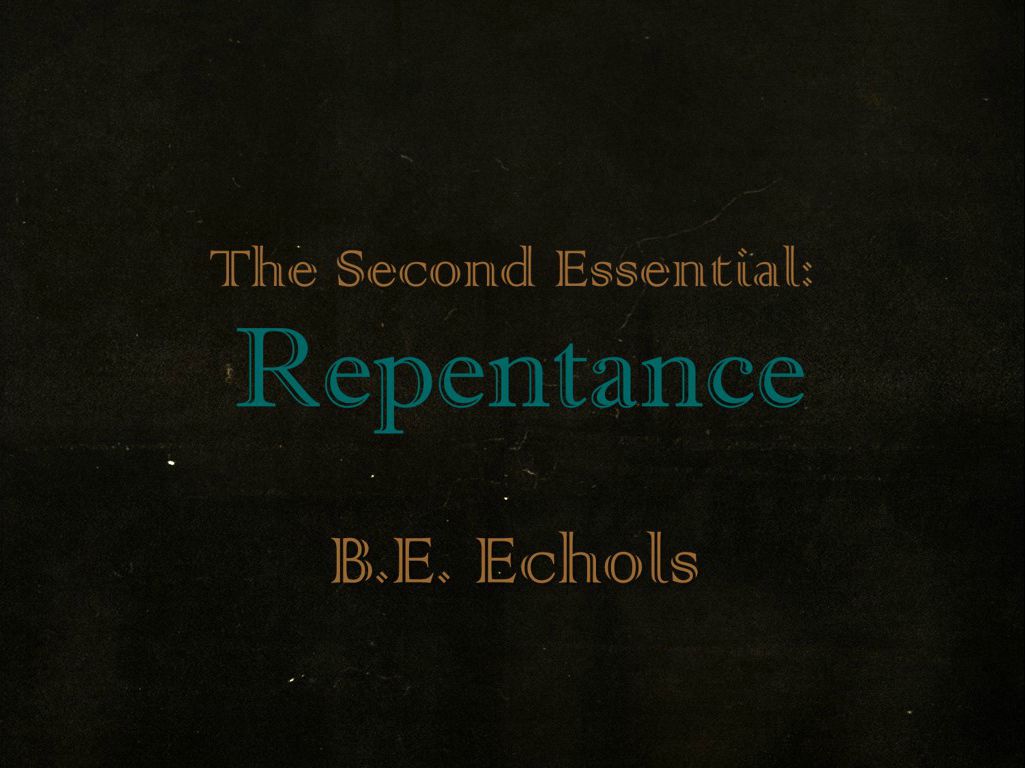When one starts out to confess and forsake his sins he begins to come face to face with them and discovers something of the sinfulness of his unrighteous and unholy thoughts, deeds, and actions. One must also be cautious lest he goes only halfway in this endeavor. There is no benefit to be derived from confessing one’s sins unless he is willing and ready to forsake them.
By B.E. Echols
To View the Entire Article, Click Here
To Download the Article Directly to Your Computer, Click Here
To View the Outline, Click Here
To View the PowerPoint, Click Here
The next thing, after one has heard the gospel of Jesus Christ preached and believed, is to repent (Acts 2:37-38). A thorough prayer of repentance prepares one for water baptism in the name of Jesus Christ for the remission of his past sins. It is unprofitable to be baptized unless one has thoroughly repented of all his sins and is ready to forsake a life of sin (Proverbs 28:13).
The Necessity And Importance of Repentance
The Scriptures are very definite and plain concerning this requirement of the gospel. Jesus had this to say: “I tell you, Nay: but, except ye repent, ye shall all likewise perish” (Luke 13:5).
We also read in II Peter 3:9: “The Lord is not slack concerning his promise” (concerning the coming of the Lord in judgment) “as some men count slackness; but is longsuffering to us-ward, not willing that any should perish, but that all should come to repentance.” God does not want anyone to be lost.
The apostle Paul emphasized the necessity of every person repenting of all his sinful acts, words, and thoughts: “While God overlooked those times of ignorance, He now calls upon all men everywhere to repent” (Acts 17:30, Goodspeed ‘s Translation). The scriptural references we just listed are not to be lightly considered by those who are seeking salvation for their souls.
Would you take another prayerful look at another scriptural quotation concerning the absolute necessity of repentance? On the Day of Pentecost, after conviction had seized the hearts of many, they asked: “Men and brethren, what shall we do?” “Then Peter said unto them, Repent, and be baptized every one of you” (Acts 2:37:18). Repentance was so important that he commanded “every one” to repent. It is my hope that you are thoroughly convinced of your need of repentance, if you have not already repented. We shall deal with another point connected with this subject.
Confessing And Forsaking All Sin
When one starts out to confess and forsake his sins he begins to come face to face with them and discovers something of the sinfulness of his unrighteous and unholy thoughts, deeds, and actions. One must also be cautious lest he goes only halfway in this endeavor. There is no benefit to be derived from confessing one’s sins unless he is willing and ready to forsake them. Moreover, it does no good to try to forsake sins unless one also confesses them. Note Solomon’s advice: “He that covereth his sins shall not prosper: but whoso confesseth and for-saketh them shall have (obtain) mercy” (Proverbs 28:13). First John 1:9 also says: “If we confess our sins, he is faithful and just to forgive us our sins, and to cleanse us from all unrighteousness.” In Isaiah 55:7, we have another exhortation concerning the forsaking of sinful ways and thoughts: “Let the wicked forsake his way, and the unrighteous man his thoughts: and let him return unto the LORD, and he will have mercy upon him; and to our God, for he will abundantly pardon.” Of course this reference only deals with the point of a sinner forsaking his sins.
As for the importance of one confessing his sins, the apostle Paul had this to say: “For with the heart man believeth unto righteousness; and with the mouth confession is made unto salvation” (Romans 10:10). So we see by this statement that one’s salvation actually depends upon whether or not he properly confesses his sins and thus repents of them. Paul further stated in Romans 14:11, “As I live, saith the Lord, every knee shall bow to me, and every tongue shall confess to God.” It is therefore an evident fact that every sinner must confess his sins, in order to obtain mercy and forgiveness from the Lord. This has been true concerning those who have lived before and after Jesus died on the cross. There are a number of Old Testament references which show that when people repented they confessed their sins. (See Ezra 10:1, 10-12; Nehemiah 9:1-3; Daniel 9:3-6, 20-22; and Joshua 7:19-20.)
To View the Entire Article, Click Here
To Download the Article Directly to Your Computer, Click Here
To View the Outline, Click Here




